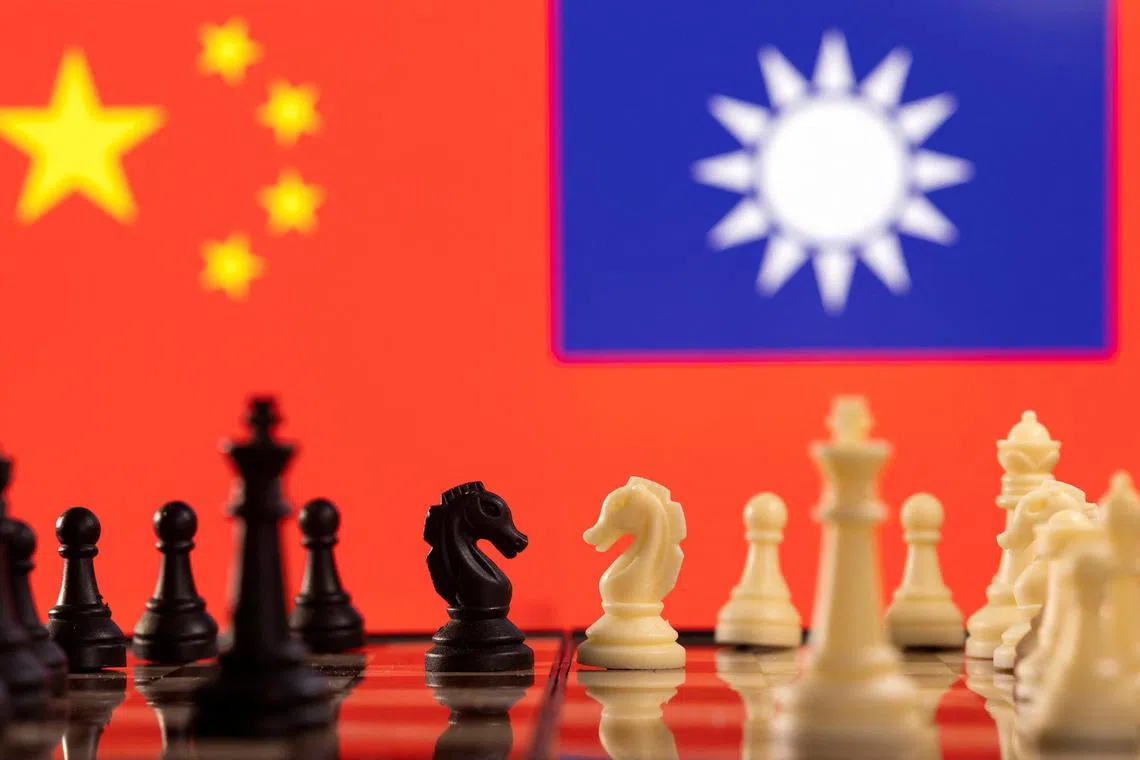Taiwan on alert for Chinese-funded election interference
Sign up now: Get insights on Asia's fast-moving developments

Some Taiwanese have been prosecuted in recent years over receiving illicit support from China in election campaigns.
PHOTO: REUTERS
Follow topic:
TAIPEI - Taiwan’s government says China will try to interfere in key elections in January by illicitly funding Beijing-friendly candidates using communications apps or group tours, according to three internal security reports reviewed by Reuters.
President Tsai Ing-wen’s government has repeatedly warned of China’s attempts to influence public opinion on the democratically governed island, which Beijing claims as its own territory despite Taipei’s strong objections.
Although senior Taiwan officials – including National Security Council head Wellington Koo – have in 2023 warned that Beijing could try to sway the presidential and legislative polls with influence campaigns including misinformation, details of how Taiwan thinks China may use illicit funding have not been reported before.
“They hope to influence Taiwanese people by reaching out to the grassroots,” said a security official with direct knowledge of the matter. “They hope to influence swing voters who don’t have particular political affiliations and would vote for whoever gives them benefits.”
High on the government’s watch list for likely recipients in Taiwan are small political parties that support Beijing’s sovereignty claims over the island, local councillors, and temples that have exchange activities with China, according one of the classified reports reviewed by Reuters.
Beijing could also offer free trips to China to hundreds of Taiwanese involved in election campaigns ahead of the vote to “influence voting decisions”, another of the internal reports said, pointing to local politicians such as borough chiefs and village heads.
The government formed a cross-ministry security task force dubbed “Ping Shun”, or safe and sound, in 2023 to look into possible voting interference at home or abroad, according to that person and another security official with direct knowledge of the matter. Both declined to be named because of the sensitivity of the matter.
It is illegal under Taiwanese law for an election campaign to receive money from “external hostile forces”, including China.
Another of the internal reports, which Reuters has reviewed and is based on Taiwanese intelligence, says China could send in money via popular Chinese social networking and chat app WeChat, which allows direct transfers among users, and is available in Taiwan.
The Chinese government could “instruct candidates to set up public WeChat accounts, and then mobilise users to give monetary support via ‘viewer donations’”, the report said. WeChat allows individuals to transfer up to 50,000 yuan (S$9,300) to others in a single transaction and a maximum of 200,000 yuan a day.
The report, citing an analysis of intelligence, also says China could work with travel agencies and ask members of tour groups to carry cash into Taiwan. It says the underground banking systems in Taiwan, which are widely known but hard to regulate, could provide foreign exchange support.
“The Chinese Communist Party could financially support specific domestic groups or people, and give them political donations or funding needed for elections,” a third classified report from the agency said.
China’s Taiwan Affairs Office did not respond to requests for comment. China has refused to talk to Ms Tsai or her Democratic Progressive Party, calling them separatists. Beijing sees the island as a renegade province to be reunified, by force if necessary.
Ms Tsai cannot run for president again because of term limits.
“China has used various means to actively intervene in elections to interfere in or influence election results,” Taiwan’s China policy-making Mainland Affairs Council said, adding that the moves were meant to push Beijing’s political agenda that included “promoting unification” with Taiwan.
Some Taiwanese have been prosecuted in recent years over receiving illicit support from China in election campaigns. A government unit in southern China sponsored Covid-19 self-testing kits for the election campaign of a borough chief candidate in New Taipei City in 2022, who was in June found guilty of violating bribery and anti-infiltration laws.
According to the reports, other possible funding channels include payment cards that use the China UnionPay network, which allows Taiwanese to legally withdraw money from bank accounts in China, as well as via direct transfers to Taiwan-based charitable funds. REUTERS

